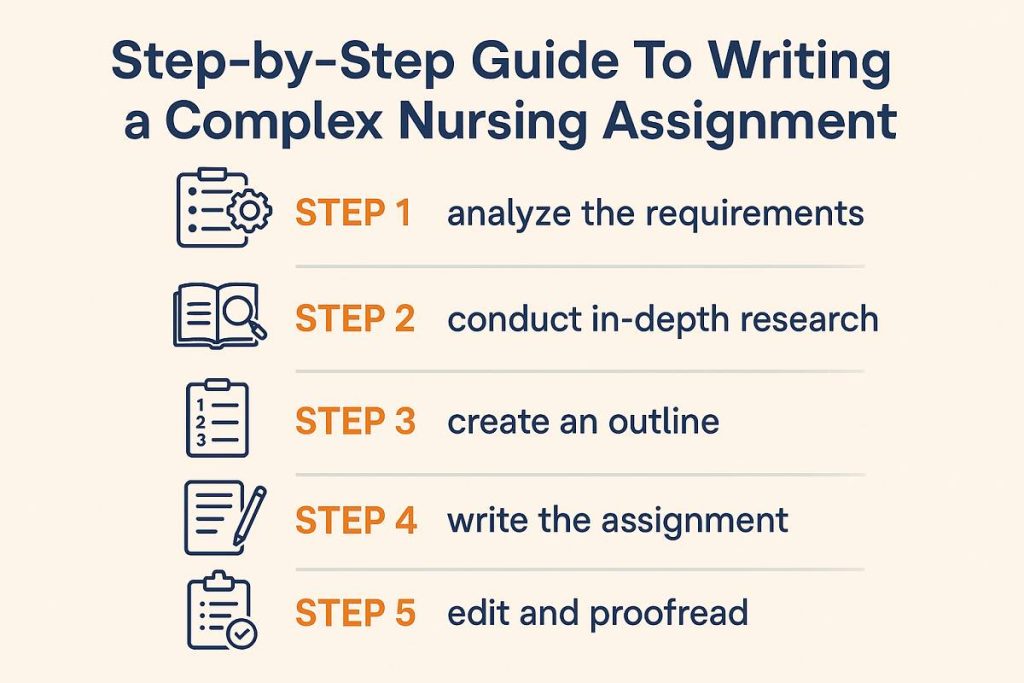Nursing is a profession that combines compassion, clinical knowledge and critical thinking. For students of Australian universities who follow nursing titles, tasks play a crucial role in the development of academic skills in preparing for professional practice.
Writing nursing tasks is more than just meeting the academic requirements-this is an understanding of theories, the application of practice based on evidence and demonstration of analytical thinking in health care scenarios.
This guide provides step by step access to writing complex nursing tasks, helping students effectively organize their work and achieve higher degrees.
Understanding The Purpose Of Nursing Tasks
Nursing tasks are designed to evaluate how well students understand theoretical knowledge and apply them to clinical situations in real life. They often include case studies, reflective writing, research and essays. By completing these tasks, students learn:
Key Learning Outcomes
- Use clinical reasoning at patient scenarios.
- Evaluate health procedures using evidence -based research.
- To communicate effectively in academic writing.
- Develop the skills of critical thinking necessary for clinical practice.
Tasks are not just academic exercises; They prepare nursing students for future decisions in hospitals, ages and community care.
Analysis Of Assignment Task
Students must carefully read the instructions before starting any nursing task. University instructions usually emphasize key areas such as:
- Tested specific nursing concepts.
- Number of words and formatting requirements.
- Whether the task is reflective, based on research or on a case study.
- Type of evidence required (scientific articles, clinical instructions or textbooks).
By dividing the assignment requirements, students can focus on what matters most. Searching for helping nursing at this stage can also clarify doubts and prevent an improper interpretation of the task.
Performing A Thorough Research
Nursing is rooted in practice -based practice, which means that each argument or recommendations must be supported by reliable resources. Research should include:
- Reviewed nursing magazines.
- Instructions for clinical practice published by medical organizations.
- Nursing textbooks and academic articles.
- Government health reports and case studies.
When using resources, students should evaluate their credibility and relevance. Stopped or unreliable links can weaken the assignment. Proper documented research not only adds weight to arguments, but also reflects academic integrity.
Creating A Strong Structure Of Assignment
The organization is necessary to write nursing tasks. The clear structure ensures a logical flow and facilitates the examiner to follow the analysis. Typical format includes:
Assignment Structure
- Introduction: explains the topic, emphasizes the purpose and provides a brief overview of what the assignment will apply.
- Body: divided into sections, each focusing on a key point, such as clinical analysis, theoretical explanation or nursing intervention.
- Conclusion: summarizes findings, reflects the consequences for nursing practice and provides a brief final statement.
- References: It mentions all the quoted works in the required linking style (APA, Harvard or University-specific instructions).
Having a well organized framework before writing makes it easier to maintain focus and consistency during assignments.
The Development Of Critical Analysis
One of the most important skills in nursing tasks is the ability to think critically. Instead of simply describing the patient’s condition or summary of theories, students must analyze and interpret information. For example:
- Rather than saying that the patient has diabetes, students should explain the consequences for nursing care, possible interventions and long -term management strategies.
- Instead of introducing the treatment instructions, students should evaluate their effectiveness and consider alternative approaches.
This analytical depth shows thinking at a higher level and distinguishes a strong assignment from the average. For students who are struggling with critical analysis, nursing assignment help with the allocation of professional nursing can provide instructions in structuring arguments and improving academic writing.
Writing With Clarity And Accuracy
Nursing tasks often deal with complex medical conditions and procedures. However, clarity should always be a priority. Students should avoid unnecessary jargon and focus on the exact professional language. Each part should be smoothly connected using transient phrases to maintain readability.
For example:
- Bad writing: “The patient got medication and then felt better.”
- Better writing: “The patient was administered by the prescribed antihypertensive medicine that led to stabilized blood pressure within 30 minutes.”
Clear and brief writing reflects professionalism and ensures that the task effectively communicates ideas.
Using Evidence To Support Arguments
Any claim in the nursing task should be supported by credible evidence. This may include research studies, case reports or government health care data. For example:
- If it discusses the control of infection, it strengthens the instructions with the quotation of the World Health Organization (WHO) instructions.
- When analyzing the patient’s mental health plan, the patient adds depth to the appropriate nursing models.
Students must also avoid excessive reliance on direct quotations. Paraphrase shows understanding and improves the assignment flow, provided that the correct citations are included.
Formatting And Correct Reference
The presentation is as important as the content. Universities in Australia often require strict formatting styles such as APA or Harvard. Common requirements include:
- Double and readable fonts.
- Correct use of headings and garter.
- Quote in the text corresponding to the reference list.
- Precisely inclusion of pages and publication data.
Incorrect links can lead to plagiarism problems that universities take seriously. Using tools or promoting academic writing can make this task easier.
Effective Time Management
Time management is a common challenge for nursing students who balance clinical locations, part -time jobs and academic work. It starts early, creating a study plan and a division of assignment into smaller sections can reduce stress.
Searching for help to assign nursing can also be valuable if the deadlines are tight, allowing students to present polished work without endangering quality.
The Last Thoughts
Writing comprehensive nursing tasks requires more than remembering theory – requires critical thinking, research, organization and clear communication. For students of Australian universities, these tasks are opportunities to demonstrate academic skills in preparing for the responsibility of professional nursing practice.



